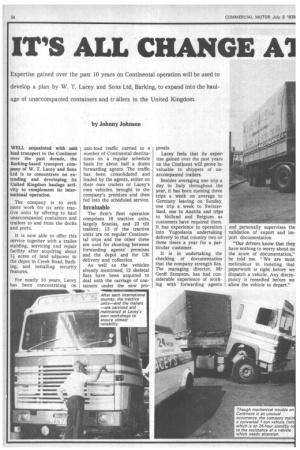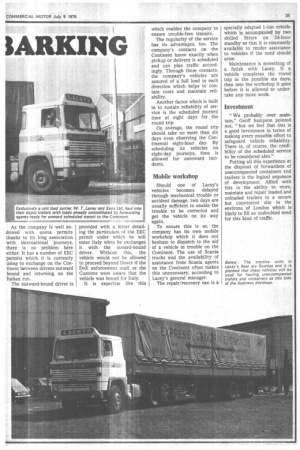IT'S ALL CHANGE Al
Page 36

Page 37

If you've noticed an error in this article please click here to report it so we can fix it.
by Johnny Johnson
WELL acquainted with unit load transport to the Continent over the past decade, the Barking-based transport company of W. T. Lacey and Sons Ltd is to concentrate on extending and developing its United Kingdom haulage activity to complement its international operation.
The company is to seek more work for its artic tractive units by offering to haul unaccompanied containers and trailers to and from the docks and ports.
It is now able to offer this service together with a trailer stabling, servicing and repair facility after acquiring about 11 acres of land adjacent to the depot in Creek Road, Barking, and installing security features.
For nearly 10 years, Lacey has been concentrating on unit-load traffic carried to a number of Continental destinations on a regular schedule basis for about half a dozen forwarding agents. The traffic has been consolidated and loaded by the agents, either on their own trailers or Lacey's own vehicles, brought to the company's premises and then fed into the scheduled service.
Invaluable
The firm's fleet operation comprises 16 tractive units, largely Scanias, and 23 tilt trailers ; 13 of the tractive units are on regular Continental trips and the other three are used for shunting between forwarding agents' premises and the depot and for UK delivery and collection As well as the vehicles already mentioned, 12 skeletal flats have been acquired to deal with the carriage of containers under the new pro posals.
Lacey feels that its expertise gained over the past years on the Continent will prove invaluable to shippers of unaccompanied trailers.
Besides averaging one trip a day to Italy throughout the year, it has been running three trips a week on average to Germany leaving on Sunday, one trip a week to Switzerland, one to Austria and trips to Holland and Belgium as customers have required them. It has experience in operation into Yugoslavia undertaking delivery to that country two or three times a year for a particular customer.
It is in undertaking the checking of documentation that the company strength lies. The managing director, Mr Geoff Sampson, has had considerable experience of working with forwarding agents and personally supervises the validation of export and import documentation.
"Our drivers know that they have nothing to worry about on the score of documentation," he told me. "We are most meticulous in insisting that paperwork is right before we dispatch a vehicle. Any discrepancy is remedied before we allow the vehicle to depart." As the company is well endowed with quota permits thanks to its long association with international journeys, there is no problem here either. It has a number of EEC permits which it is currently using to exchange on the Continent between drivers outward bound and returning on the Italian run.
The outward-bound driver is provided with a letter detailing the particulars of the EEC permit under which he will enter Italy when he exchanges it with the inward-bound driver. Without this, the vehicle would not be allowed to proceed beyond Dover if the DoE enforcement staff or the Customs were aware that the vehicle was bound for Italy.
It is expertise like this which enables the company to ensure trouble-free transits.
The regularity of the service has its advantages, too. The company's contacts on the Continent know exactly when pickup or delivery is scheduled and can plan traffic accordingly. Through these contacts, the company's vehicles are assured of a full load in each direction which helps to contain costs and maintain reliability.
Another factor which is built in to sustain reliability of service is the scheduled journey time at eight days for the round trip.
On average, the round trip should take no more than six days even observing the Continental eight-hour day. By scheduling its vehicles on eight-day journeys, time is allowed for untoward incidents.
Mobile workshop
Should one of Lacey's vehicles becomes delayed through mechanical trouble or accident damage, two days are usually sufficient to enable the trouble to be corrected and get the vehicle on its way again.
To ensure this is so, the company has its own mobile workshop which it does not hesitate to dispatch to the aid of a vehicle in trouble on the Continent. The use of Scania trucks and the availability of assistance from Scania agents on the Continent often makes this unnecessary, according to Lacey's general manager.
The repair/recovery van is a specially adapted 1-ton vehicle which is accompanied by two skilled fitters on 24-hour standby so that it is constantly available to render assistance to vehicles if the need should arise.
Maintenance is something of a fetish with Lacey. If a vehicle completes the round trip in the possible six days) then into the workshop it goes before it is allowed to undertake any more work.
Investment
"We probably over maintain," Geoff Sampson pointed out, "but we feel that this is a good investment in terms of making every possible effort to safeguard vehicle reliability. There is, of course, the credibility of the scheduled service to be considered also."
Putting all this experience at the disposal of forwarders of unaccompanied containers and trailers is the logical sequence of development. Allied with this is the ability to store, maintain and repair loaded and unloaded trailers in a secure but convenient site in the environs of London which is likely to fill an undoubted need for this kind of traffic.




















































































